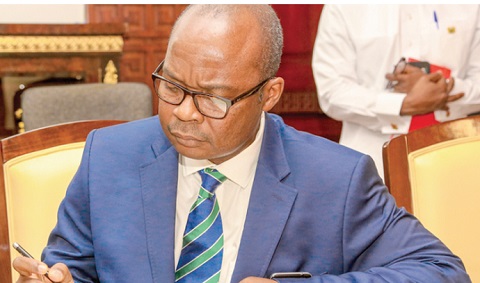Dr Addison, who addressed the media yesterday in the wake of rising tension over the swift takeover, gave the assurance that customer deposits were safe.
“I assure customers that no one will lose their deposits, and you can continue to do business with GCB Bank.”
The BoG announced on Monday that it had approved a Purchase and Assumption transaction with GCB Bank Limited, an agreement which was set to transfer all deposits and selected assets of UT Bank Ltd and Capital Bank Ltd to GCB Bank Ltd. The regulator had revoked the licenses of UT Bank Ltd and Capital Bank Ltd.
According to the BoG, the two distressed banks were heavily deficient in capital and liquidity, and their continuous operation could have jeopardised not only their depositors’ funds, but also posed a threat to the stability of the financial system.
“The approval by the Bank of Ghana of this transaction is to strengthen Ghana’s banking sector, ensure financial stability and protect depositors’ funds,” it said.
Dr Addison revealed that majority of the players in the banking industry had hitherto had challenges passing the Asset Quality Review (AQR) conducted in 2015, noting that “a number of banks were not compliant with the capital adequacy ratio.”
The AQR showed significant vulnerability of banks to the turbulent economic conditions, meaning if the affected banks were to provision fully for all bad loans, a significant number of them would collapse.
However, he said, with time, most banks had complied.
“Most of these banks have put in place credible action plans to restore the capital deficiency, and majority of these banks are already compliant as at today, and the overall banking system remains solid and well-capitalised,” the Governor said.
The governor further assured that the acquisition of selected assets and deposit liabilities of UT Bank and Capital Bank by GCB Bank formed part of efforts by the bank to further broaden its reach and grow its balance sheet to support a fast-growing economy, which was in line with “our broad objective to position the financial sector to support the government’s transformational agenda.”
Sanctions for directors of collapsed banks
The Central Bank has, however, indicated it will investigate and apply the necessary sanction to officials of the two banks whose actions or inactions led to the collapse.
“The last phase of the BoG’s action would involve a thorough investigation of operations of UT Bank and Capital Bank, and appropriate action will be taken against shareholders, directors, and key management personnel who are found to be culpable,” the BoG Governor stated.
More banks in distress
There are, however, indications that more banks may also be on the brink of collapse if immediate steps are not taken by their shareholders and directors to save them from crumpling, The Finder has gathered.
These banks (name withheld), according to sources, have been in very shaky situation for some time now due to high non-performing loans and illiquidity. Indications are that if nothing was done in the immediate to solve their problems, the Bank of Ghana might revoke their licenses soon. According to sources, 90 per cent of these banks are said to be Ghanaian private banks.
Deputy Finance Minister, Kwaku Kwarteng gave credence to this when he called on the Central Bank to up its supervisory role of banks in the country as indications are that more local banks could be in great distress.
Although he would not give names of the supposed distressed banks, he indicated that the case of the two collapsed banks represent the severer cases of banks under pressure.
The situation is even worse because of the tough posture of the International Monetary Fund (IMF), which had directed the Bank of Ghana to crack the whip on ailing universal banks in the country. It will be recalled that the Central Bank, through accounting professionals, PricewaterhouseCoopers (PwC), in 2016, conducted a stress test on universal banks in the country.
The stress test revealed that the capital adequacy ratios of many banks have been negatively impacted by the high NPLs, some to the point of becoming insolvent, while liquidity also remains a major concern.
A banking industry person told this paper that most of the financials released by these banks are doctored to attract the consuming public.
It will also be recalled that Vice-President Dr Mahamudu Bawumia, then a vice-presidential candidate for the NPP, said at a public lecture that “eight banks were identified to exhibit significant weaknesses, with capital adequacy ratios below 10 per cent (some below 5 per cent) and nearing collapse.”
According to him, the Asset Quality Review of Banks conducted in 2015 shows significant vulnerability of banks to current economic conditions, and that if the affected banks were to provision fully for all bad loans, a significant number of them would collapse.
He added that the level of impaired loans in one of the largest commercial banks had quadrupled, adding that the situation was becoming widespread in the banking sector.
Closure of two banks long overdue
Many industry watchers who spoke to this paper said the closure of these banks were long overdue following their distressed state, running into four years ago.











 (Selorm) |
(Selorm) |  (Nana Kwesi)
(Nana Kwesi)